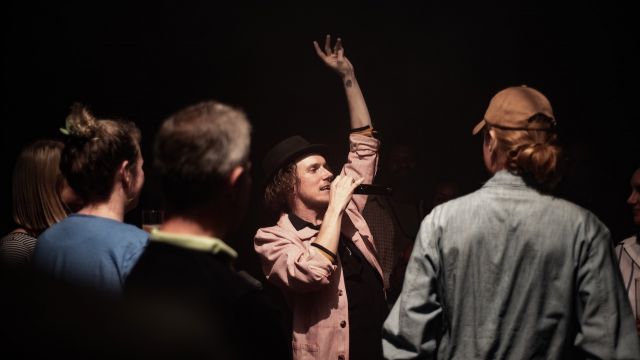The Gods, The Gods, The Gods
It’s late on Saturday night, and the Adelaide Fringe hub Gluttony is pulsating with the energy of thousands of people, mostly emerging from their final show to go home – or, like a few of us, walking towards their next. The tent flap is pulled aside and we’re welcomed into hazy light, where there are no seats – only space to dance. For great storytelling and theatre, this isn’t the environment we were expecting: it’s set up for a gig full of sweaty, moving people. What’s amazing is that we all become that crowd through the power of the spoken word, the euphoria of the sung lyric, a chord from a guitar, and the thump of a drum you can feel in your core.

The stories from creators Alex Wright and Phil Grainger are founded in Greek mythology, and this is no exception, yet it is but one narrative thread of this show – and the style of delivery has a different energy to their other offering at Adelaide this year (Orpheus). Expanding on the combination of spoken word and song shared between Wright and Grainger, singer Megan Drury adds a third voice to the four stories told across twelve songs. Wright’s superb wordplay shines strong and he moves seamlessly between his usual spoken word, slam poetry, and this time, into more rhythmic rhyme as rap. Tom Figgins underpins Grainger’s guitar with rich beats and tones, and George Cort’s lighting design is another element to this narrative, giving us focus on a performer, or washing us in colour.

Wright, Grainger, and Drury each have their own stage, placed triangularly around the ‘dance floor’, but they don’t stick to their marks, instead moving freely amongst the audience as they sing and speak and immerse. They inject an incredible kind of energy that comes from the music, the words, and the performers themselves.

The lyrics are overlapping stories: there’s a meeting of the old Gods trying to decide their relevance and future, threatened with newer versions of themselves (with echoes from Neil Gaiman’s novel American Gods); there’s a couple newly in love debating the merits of their own spiritual beliefs; stark wisdom rising from grief (narrated by the writers’ friend, Bronwyn); and another dealing with a man standing on a bridge, contemplating giving up on life. It’s an incredible philosophy lesson that’s both mindfully happy and gloriously tragic.
Mark Wickett
Subscribe to our E-Newsletter, buy our latest print edition or find a Performing Arts book at Book Nook.

